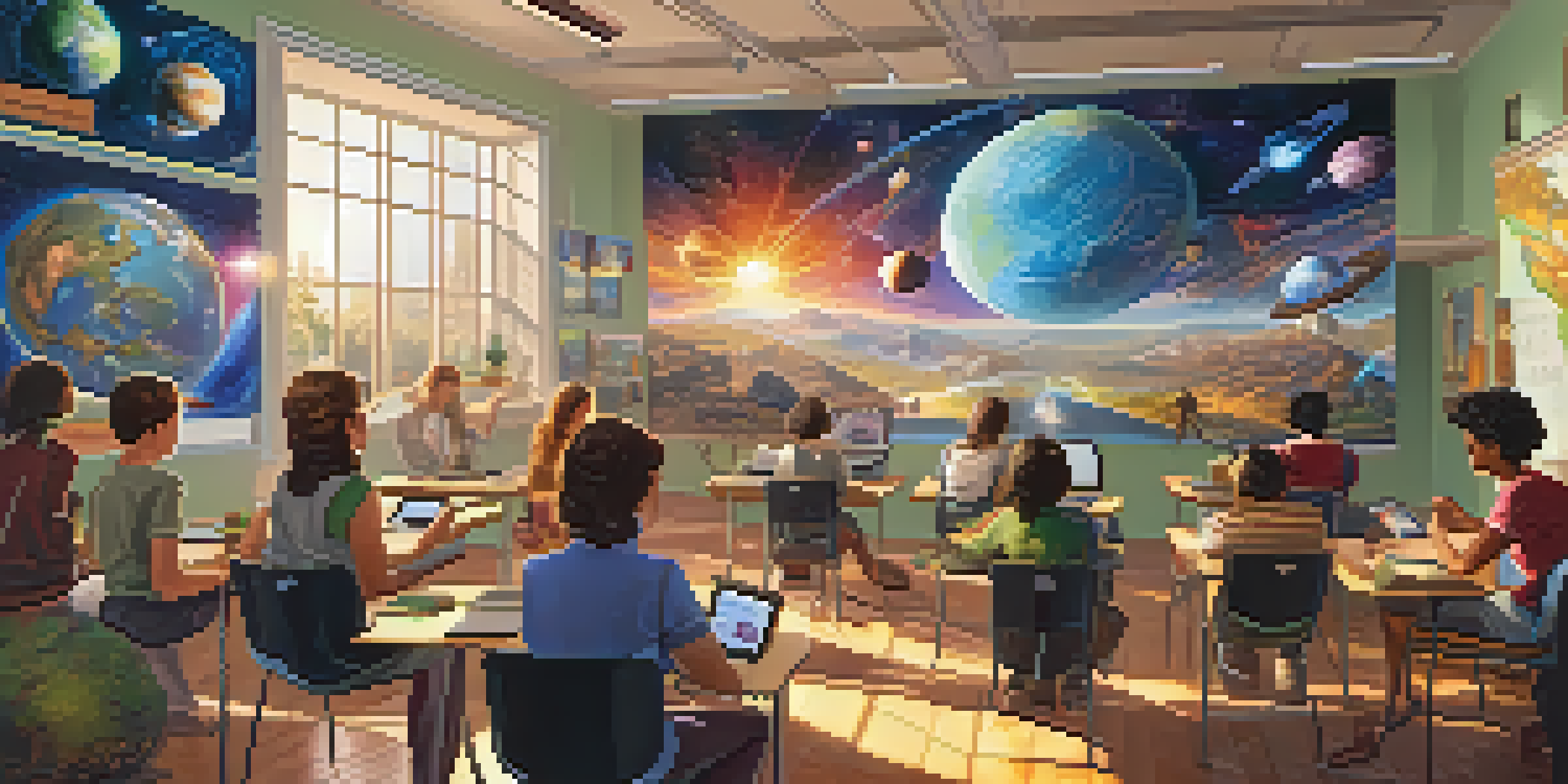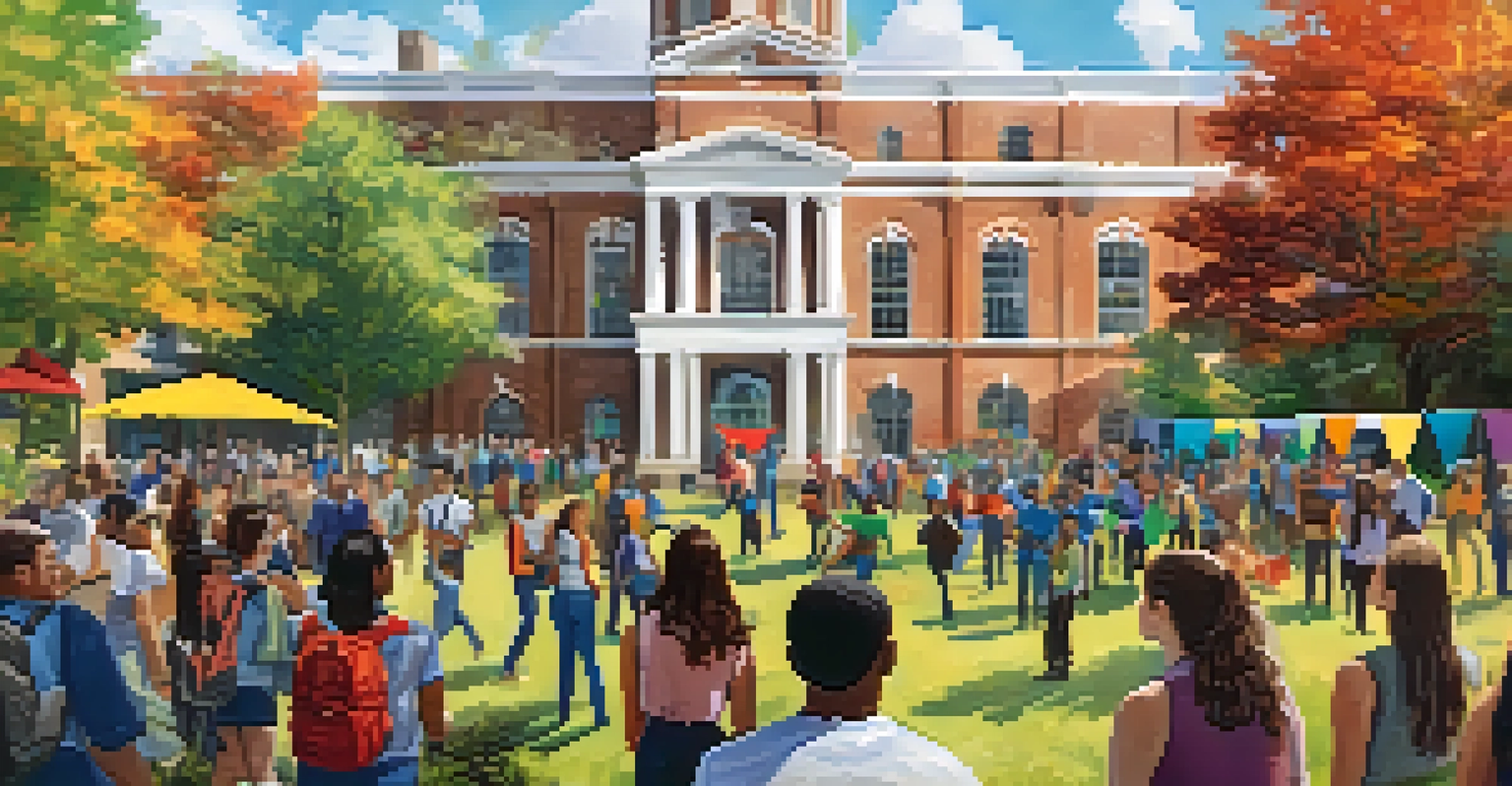The Future of Education: Trends from the University of Washington

Embracing Technology in Learning Environments
The integration of technology in education has become more essential than ever. At the University of Washington, innovative tools like virtual reality and AI are reshaping how students engage with their subjects. For instance, VR can transport students to ancient civilizations or distant planets, making learning immersive and exciting.
Education is the most powerful weapon which you can use to change the world.
Moreover, online platforms are facilitating access to educational resources, allowing students to learn at their own pace. This flexibility not only caters to diverse learning styles but also supports those balancing studies with work or family commitments. It's a game-changer in creating a more inclusive educational landscape.
As technology continues to evolve, the University of Washington is committed to staying at the forefront of these advancements. By fostering an environment where tech and education intersect, they're preparing students for a future where digital literacy is paramount.
Personalized Learning: Tailoring Education to Individual Needs
Personalized learning is gaining traction as a significant trend in modern education. At UW, educators are focusing on tailoring learning experiences to meet individual student needs and preferences. This approach recognizes that one size does not fit all, enabling students to thrive in ways that resonate with their unique strengths.

Using data analytics and adaptive learning technologies, instructors can identify areas where students excel or struggle. This insight allows for more targeted support, ensuring that every student receives the guidance they need to succeed. Imagine a classroom where each student follows a customized learning path—this is the future that UW is ushering in.
Technology Transforms Education
The integration of innovative tools like VR and AI enhances student engagement and accessibility in learning.
This shift not only enhances academic performance but also boosts student engagement. When learners have a say in their education, they’re more likely to take ownership of their learning journey, leading to greater motivation and satisfaction.
Interdisciplinary Learning: Breaking Down Academic Silos
Interdisciplinary learning is becoming a hallmark of education at the University of Washington. This approach encourages students to draw connections between different fields of study, promoting a more holistic understanding of complex issues. For example, combining insights from science, technology, and ethics can lead to innovative solutions in sustainability.
The beautiful thing about learning is that no one can take it away from you.
By fostering collaboration among diverse disciplines, UW prepares students to tackle real-world challenges with a multifaceted perspective. This not only enriches their academic experience but also equips them with the skills needed in today's interconnected job market.
Students are learning to think critically and creatively across subject boundaries, which is crucial in an age where problems often require diverse solutions. As a result, graduates emerge not just as specialists, but as versatile thinkers ready to make an impact.
The Role of Community Engagement in Education
Community engagement is increasingly recognized as a vital component of education, and UW is leading the charge. By connecting academic learning with real-world community issues, students gain practical experience while making a positive impact. For instance, service-learning programs allow students to apply their knowledge to address local challenges.
This hands-on approach enriches the educational experience and fosters a sense of social responsibility. Students learn that education extends beyond the classroom, cultivating empathy and a desire to contribute to society. It's a powerful reminder that knowledge is most beneficial when shared.
Personalized Learning Gains Momentum
Tailoring education to individual needs through data analytics fosters student success and motivation.
As students engage with their communities, they also develop essential skills like teamwork, communication, and problem-solving. These experiences not only enhance their resumes but also prepare them to be active, informed citizens in a global society.
The Shift to Lifelong Learning: An Ongoing Journey
The concept of lifelong learning is becoming increasingly important in today's fast-paced world. At UW, there's a growing emphasis on fostering a mindset of continuous growth, where education doesn't stop after graduation. This shift encourages individuals to seek out new skills and knowledge throughout their lives.
With the rapid changes in technology and job markets, adapting to new information and skills is crucial. UW supports this idea by offering a range of continuing education programs, ensuring that alumni and community members have access to valuable resources long after they leave campus.
Embracing lifelong learning means acknowledging that education is an ongoing journey rather than a destination. This perspective empowers individuals to stay relevant and adaptable in their careers, contributing to personal and professional fulfillment.
Global Perspectives: Expanding Educational Horizons
Globalization is reshaping the educational landscape, and the University of Washington is embracing this trend. By promoting international collaboration and exchange programs, UW encourages students to gain diverse perspectives and experiences beyond their local communities. Studying abroad or participating in global projects broadens students' understanding of different cultures and practices.
Incorporating global perspectives into the curriculum helps students become more effective communicators and problem solvers in a diverse world. For example, students might work on projects addressing international issues, fostering teamwork across borders and disciplines.
Mental Health is a Priority
Recognizing the link between academic success and well-being, UW emphasizes mental health support for students.
As the world becomes increasingly interconnected, having a global mindset is essential for future leaders. UW's commitment to expanding educational horizons prepares students to navigate and contribute to an ever-changing global landscape.
Mental Health and Well-Being in Education
Recognizing the importance of mental health in education, UW is prioritizing student well-being as a fundamental aspect of the learning experience. Schools are beginning to understand that academic success is closely tied to mental health, leading to initiatives that support students both emotionally and academically. Programs that promote mindfulness and stress management are becoming integral to campus life.
By creating a supportive environment, UW encourages students to seek help when needed, reducing stigma and fostering a culture of care. This holistic approach not only enhances academic performance but also contributes to a healthier university community.

As we look to the future, addressing mental health in educational settings will be crucial. Ensuring that students have access to resources for their mental well-being empowers them to thrive both in and out of the classroom.